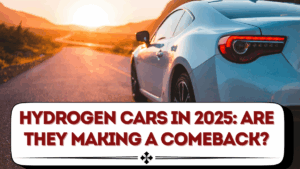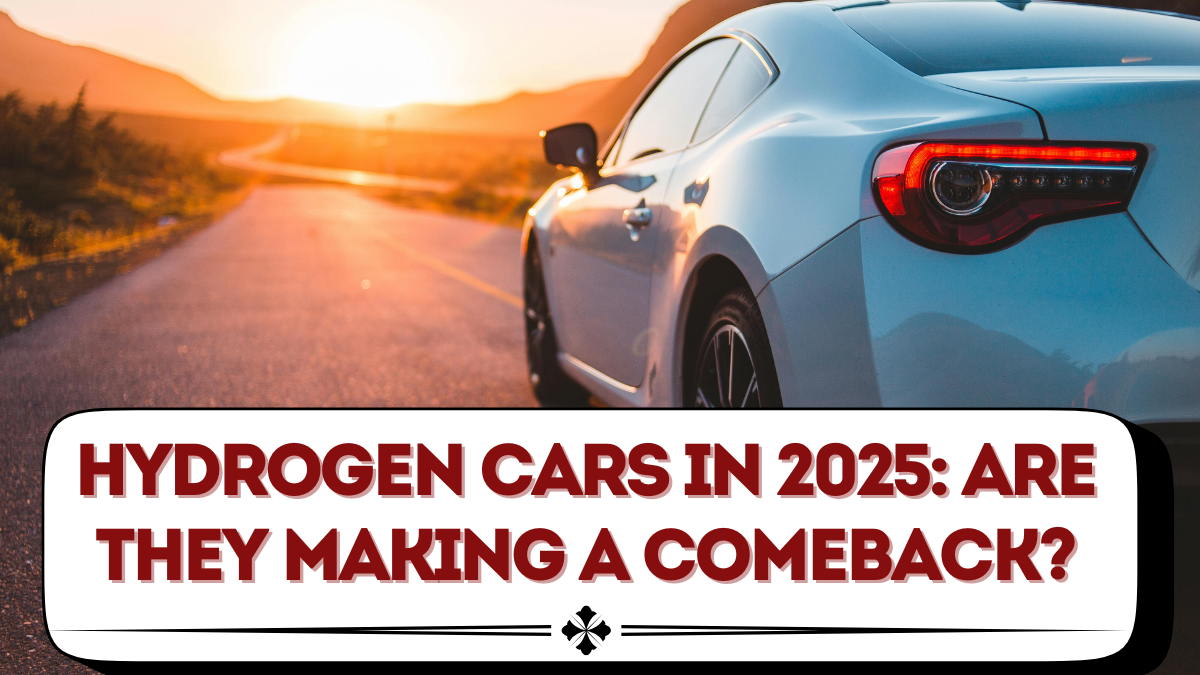For years, electric vehicles (EVs) have dominated headlines, but 2025 is witnessing renewed interest in another clean technology—hydrogen cars. Often overlooked due to infrastructure challenges, fuel-cell vehicles are regaining attention as automakers, governments, and clean energy advocates highlight their potential in reducing emissions and offering fast refueling.
With Toyota, Hyundai, and other companies leading innovation, hydrogen cars 2025 are re-emerging as serious contenders in the race toward sustainable mobility. But the question remains: are they truly making a comeback?

What Are Hydrogen Cars?
Hydrogen cars, also called fuel-cell electric vehicles (FCEVs), use hydrogen gas to generate electricity. Instead of storing power in large batteries like EVs, these cars run on fuel cells that combine hydrogen with oxygen to produce electricity, emitting only water vapor.
Key characteristics of hydrogen cars:
-
Zero tailpipe emissions (only water).
-
Fast refueling, typically under 5 minutes.
-
Driving ranges comparable to gasoline vehicles.
-
Quieter and smoother rides than combustion cars.
Why Hydrogen Cars Are Regaining Momentum in 2025
Several factors are fueling the renewed push for hydrogen mobility this year:
-
Fast Refueling Advantage – Unlike EVs, hydrogen cars can refuel in minutes, making them ideal for long trips and commercial fleets.
-
Government Support – Policies in Europe, Japan, South Korea, and the U.S. are investing in hydrogen fueling infrastructure.
-
Energy Diversification – Hydrogen offers a complementary clean energy option alongside EVs, reducing dependence on batteries.
-
Fleet Adoption – Trucks, buses, and taxis are adopting hydrogen due to quick refueling and long-range benefits.
-
Technology Improvements – Fuel cells are becoming more efficient, lighter, and cost-effective.
Popular Hydrogen Cars in 2025
Several hydrogen-powered cars are gaining attention in 2025:
-
Toyota Mirai – A pioneer in the hydrogen space, offering sleek design and improved range.
-
Hyundai Nexo – A practical hydrogen SUV with strong performance.
-
Honda Clarity Fuel Cell – Known for comfort and reliability, though with limited availability.
-
BMW iX5 Hydrogen – A luxury SUV integrating hydrogen technology.
Hydrogen Cars vs Battery EVs
| Feature | Hydrogen Cars | Battery EVs |
|---|---|---|
| Refueling Time | 3–5 minutes | 30–60 minutes (fast charging) |
| Range | 300–400+ miles | 250–400 miles |
| Infrastructure | Limited hydrogen stations | Widespread charging points |
| Energy Storage | Hydrogen tanks | Lithium-ion batteries |
| Emissions | Water vapor only | Zero emissions |
| Cost | Higher upfront | Falling prices |
This shows that hydrogen cars excel in refueling speed and range, but face infrastructure limitations compared to EVs.
Advantages of Hydrogen Cars
-
Quick Refueling – Similar to gas cars, perfect for drivers who value time.
-
Long Range – Suited for commercial transport and long-distance driving.
-
Environmentally Friendly – Emits only water vapor, reducing carbon footprint.
-
Lightweight Power Source – Hydrogen tanks are lighter than heavy EV batteries.
-
Scalable for Fleets – Buses, trucks, and taxis benefit greatly from hydrogen adoption.
Challenges Facing Hydrogen Cars
Despite their promise, hydrogen cars face obstacles in 2025:
-
Lack of Infrastructure – Refueling stations are sparse outside of select regions.
-
High Costs – Fuel cells and hydrogen tanks are still expensive.
-
Energy Production Concerns – Hydrogen production can be carbon-intensive unless sourced from renewables.
-
Consumer Awareness – Many drivers remain unfamiliar with hydrogen technology.
-
Competition with EVs – Battery electric vehicles dominate due to broader charging networks.
Global Outlook for Hydrogen Cars in 2025
-
Japan & South Korea – Leading hydrogen adoption with nationwide fueling stations.
-
Europe – Germany and France investing heavily in hydrogen corridors.
-
United States – California remains the hub, with expansion slowly reaching other states.
-
China – Aggressively pursuing hydrogen buses and trucks alongside EV dominance.
FAQs
Are hydrogen cars better than EVs?
Not necessarily. Hydrogen cars refuel faster and suit long-distance use, while EVs benefit from widespread infrastructure.
How much does it cost to refuel a hydrogen car?
On average, $60–$80 per tank, depending on regional hydrogen prices.
Are hydrogen cars safe?
Yes, tanks are reinforced and tested to withstand extreme conditions, making hydrogen vehicles as safe as gasoline cars.
Will hydrogen cars become mainstream in 2025?
Not yet. They are growing in niche markets like fleets and commercial use, but EVs still dominate consumer adoption.
Which is the most popular hydrogen car in 2025?
The Toyota Mirai continues to lead globally, followed by Hyundai Nexo.
Conclusion
In 2025, hydrogen cars are regaining momentum as governments, automakers, and consumers explore alternative clean energy solutions. With quick refueling, long ranges, and eco-friendly performance, they are proving especially valuable for commercial fleets and long-distance drivers. However, infrastructure gaps and high costs remain barriers to mainstream adoption. While EVs dominate passenger markets, hydrogen cars are carving out an important role in the broader clean mobility revolution.
Click here to know more.
